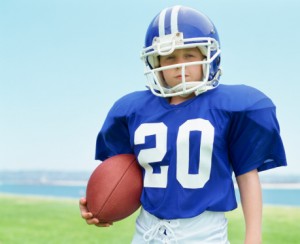1/5/16 blog post
5 things to know if your kid plays football
The risks of playing football, and growing concerns related to long-term consequences of concussions, are all over the news and social media right now. Regardless of how you came to the decision, your child is going to play football. How can you ensure his safety? I wish I could tell you what I do with my son, but he’s 2. The last time he saw a football, he said “I found a brown egg” and kicked it about 6 inches. I don’t think he’s quite ready yet. However, if and when he chooses to play football, here is what I’ll be looking for:
- Good coaching Learning to tackle is more about quality than quantity. Are the kids being taught proper technique? Or are they just told to run as fast as they can at the target? Football teams today spend less time tackling in practice than they used to. That’s fine, but I want to make sure the time they spend tackling is spent on learning technique, not just force. Learning how to tackle (and be tackled) correctly can be the difference between whether or not a child gets injured.
- Good tackling I have been a football fan since childhood, but many moms aren’t. How do you know if your child is tackling correctly? Tackles should be made while looking at your target, not looking down. Looking down and tackling head-first is called spear-tackling. It is dangerous, banned, puts children at risk of spinal cord injuries, and it is still done frequently. If I see my son spear-tackle, I won’t be afraid to personally walk onto the field and drag him off. I don’t care if it embarrasses him. If the coach encourages it, we are done for the season and I’m notifying the league. You may see players wearing extra gear called a neck roll or cowboy collar. These are meant to reduce other types of injuries, but can actually encourage spear tackling by making it difficult to extend the neck. My son won’t wear one. If he has injuries which require him to wear one, he’s either moving to a different position or he’s done with football.
- Good equipment To date, no equipment is proven to prevent concussions. Mouth guards, face guards, and helmets all help reduce other injuries. Some are more serious than concussions, such as skull fractures. They also help protect against lacerations, eye injuries, and broken teeth. But the equipment is only as good as the fit. Equipment should fit properly and be worn correctly. If not, my son is not playing. The mouth guard should be in place, chin strap secured, and helmet not too loose.
- Good culture Let’s face it. My son isn’t playing pro. Your son isn’t playing pro. They aren’t being paid to play. They aren’t going to make a living off of football. Football isn’t going to pay for care if they have brain injuries. This is just for fun. Any team my son plays for needs to keep this in perspective. They need to foster a health-first culture. I was an athlete and understand the phrase “no pain, no gain.” I have the old injuries to prove it. But any injury which affects the brain should not be hidden or pushed through. My son needs to play for a team that recognizes and respects that he is going to eventually make a life from his brain, not his football. They need to put his brain health above winning. If I hear he plays through concussion symptoms, he is done for the season.
 Good balance Believe it or not, there are sports which receive less attention than football whose athletes are at equal or higher risk of sustaining concussions. These include hockey, gymnastics, wrestling, and men’s lacrosse. I don’t want my son (or daughter!) to be a single-sport athlete. But if he plays football, I want his other sports to have lower head injury risks than football. In sports medicine, we categorize sports as collision, contact, and non-contact. Collision sports have intentional contact, like football and wrestling. Contact sports have incidental contact, like baseball and basketball. Non-contact sports are exactly what they sound like – non-contact. These include cross country, swimming, and golf. If my son plays a collision sport, he can pick ONE collision sport. I can’t back this one up with science, unfortunately. This is my personal opinion.
Good balance Believe it or not, there are sports which receive less attention than football whose athletes are at equal or higher risk of sustaining concussions. These include hockey, gymnastics, wrestling, and men’s lacrosse. I don’t want my son (or daughter!) to be a single-sport athlete. But if he plays football, I want his other sports to have lower head injury risks than football. In sports medicine, we categorize sports as collision, contact, and non-contact. Collision sports have intentional contact, like football and wrestling. Contact sports have incidental contact, like baseball and basketball. Non-contact sports are exactly what they sound like – non-contact. These include cross country, swimming, and golf. If my son plays a collision sport, he can pick ONE collision sport. I can’t back this one up with science, unfortunately. This is my personal opinion.
So in conclusion...
Whether you’re excited or scared about your child playing football, I hope this can educate and empower you to keep your child as safe as possible while allowing him to have fun.

